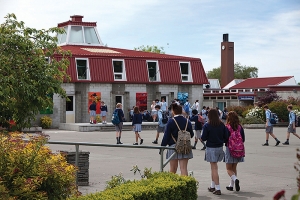Search

 An innovative curriculum change at Ashburton College has been given overwhelming support by both students and parents.
An innovative curriculum change at Ashburton College has been given overwhelming support by both students and parents.
The college has developed a pilot programme for next year’s Year 9 students that will use a new approach to learning based on developing students’ resilience, creative problem solving and communication skills.
About 60 per cent of next year’s Year 9 students will be involved in the pilot that will see students involved in a project based learning model that sees the integration of some subjects rather than working on the traditional standalone subject model, principal Ross Preece said.
“I’m really pleased with the response from both parents and staff; it looks as though we’ll have five or six of our 10 or 11 Year 9 classes in the pilot next year.”
The move into project-based learning would be a gentle one, however, with students spending between nine and 12 hours each week in pilot classrooms and the remainder in a traditional learning environment.
“Yes, there were parents concerned that they were making the right choice, but at the end of the day, but were not discarding tradition.
“You’ll still know how your child is achieving in standard subjects but we’ll also be reporting on what engages your child,” he said.
Project based learning was already being piloted in a number of other schools around New Zealand and the new model is similar to the learning environment students were accustomed to at intermediate and primary level, he said.
“But this is massive change, the first change in education in 100 plus years.”
Parents liked the new approach to learning because it prepared their child for what would be an uncertain future in a changing workplace, Preece said.
“We all acknowledge the future will be different and we can’t carry on doing the same as we have done in education for more than 100 years.
“It’s served us well but schools now have to be prepared to do things differently.
“And parents are understanding the future will be different so schools need to change and be different too.”
For teachers, the new learning environment would mean significant change, away from standing in front of a classroom to becoming a facilitator who moved between groups of students.
Schools could stick with tradition in a world where the workplace was changing, but that would not serve their students well, or they could change and make learning more relevant for tomorrow’s workplace, he said.
The Year 9 trial will provide a starting point for the future whole-school curriculum and the college was committed to continuing with subject integration for Year 10 students who wanted it in 2020.
By Sue Newman © The Ashburton Guardian - 8 November 2018


